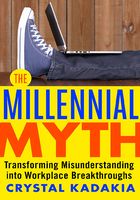
INTRODUCTION
The Perceptions We Hold Today
Every cloud has ...
a silver lining.
The greatest invention since ...
sliced bread.
Computing power ...
doubles every two years.
Millennials are ...
lazy and entitled.
Why? Why do we automatically complete this sentence with “lazy and entitled”? Why do search engines such as Google and Bing highlight these stereotypes in their autocomplete feature? Why are there a million-plus search results for “lazy and entitled” that are linked to the millennial generation? What autocomplete words do we have for other generations? And, as organizations, leaders, and coworkers, what expectations, behaviors, and contributions are we missing out on because of these biases?
Millennials, as defined in this book, are those born between 1981 and 1996. Generation Z is the generation following millennials, born in 1996 to the present, and are just beginning to graduate from college. In the last 50 years, rapid technological changes have created a vast difference between the perspectives, values, beliefs, and expectations of the older and youngest generations around the globe. The difference is so vast that we fundamentally struggle to understand the world we each come from. It’s not an exaggeration to say that different generations may see the same behaviors or dynamics in the workplace and perceive completely different things, whether positive or negative. My purpose in this book is to help bridge this gap for five of the most misunderstood behaviors, especially for the senior workers and leaders for whom millennial employees and their perceived expectations so often seem mysterious.